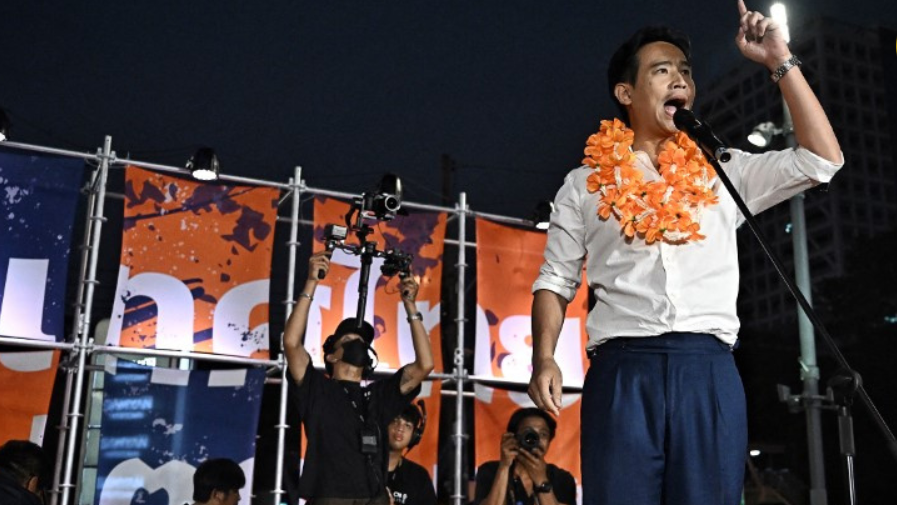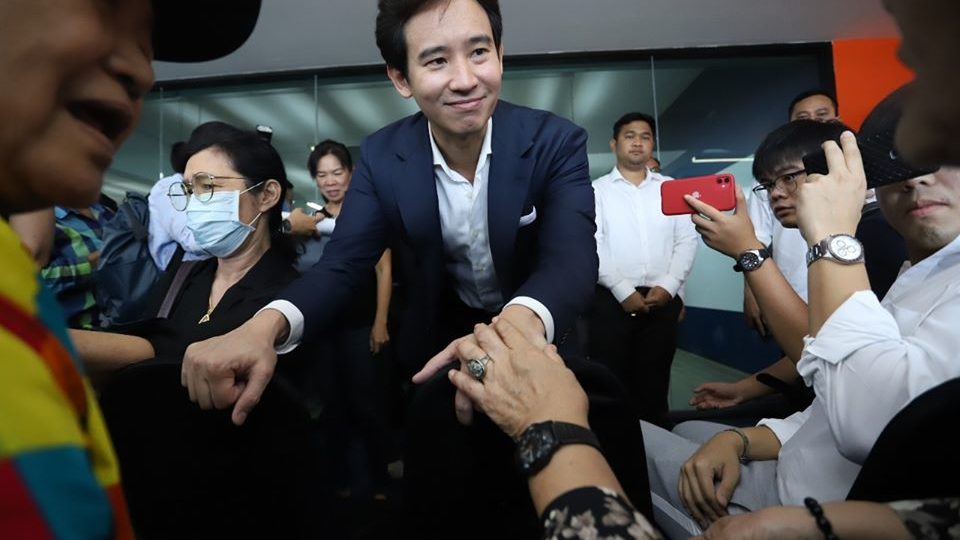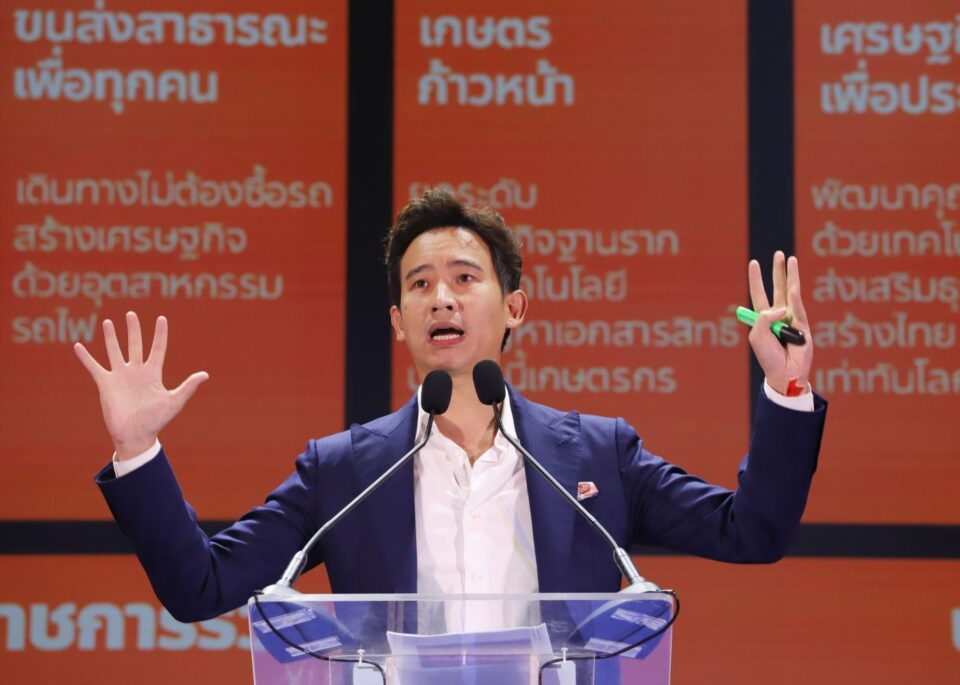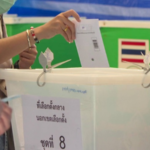Move Forward Party “fever” is now spreading from online to on the ground, with its popularity clearly rising in the run-up to the May 14 election.
Loud cheers and long applause erupt wherever its leader Pita Limjaroenrat turns up these days. Observers say no other contesting political leader has been able to whip up such a phenomenon.

“The next step for Move Forward is to translate this popularity into actual votes of support, in the same way as Chadchart Sittipunt [did during the gubernatorial election],” said Dr Olarn Thinbangtieo, a lecturer at Burapha University’s Faculty of Political Science and Law.
Olarn is convinced that Move Forward Party will perform well in the general election, perhaps even capturing seats in provinces that have long been considered the strongholds of other political camps.
Voters in Chon Buri, which has long been affiliated with the Kunplome political family that recently joined the Pheu Thai Party, gave Pita a warm welcome when he visited the province a few days ago. Locals in Samut Prakan, which is seen as a stronghold of the Bhumjaithai- and Palang Pracharath-allied Asavahame family, also greeted Pita enthusiastically during his recent campaign stop there.
Olarn estimates that to win a constituency MP seat, a candidate will need no more than 40,000 votes or support from about 25% of eligible voters. Constituency contests are often close, with winning candidates typically getting only 5% more votes than the runner-up. Since about 20% of voters remain undecided, Move Forward has a strong chance of wooing them to its side and tipping tight constituency contests in its favor, he said.
“If Move Forward adopts a good strategy, it will be able to sway undecided voters,” Olarn confirmed.
Move Forward’s strengths
Olarn believes “Pita fever” is rising because of his clear political stance. The leader of Move Forward has stated time and time again that his party will not work with the coup leader General Prayut Chan-o-cha or his ally General Prawit Wongsuwan to form a government. Although the Pheu Thai Party, which also hails from the pro-democracy camp, has delivered a similar message, it has wavered or sought to be vague over its stance from time to time.
The academic added, “Move Forward is also good at debating and campaigning on stage. “Its debaters have knowledge, information, and strong rhetoric.”
When messages are concise and clear, they can be spread easily and quickly on social media, he added. Hence, Move Forward has an online army of canvassers, or people who voluntarily help promote it, because they support its messages via social media.

Olarn said that Move Forward’s policies also resonate well with voters who wanted to see changes in their homeland via its liberal policies.Pita fever’
Nida Poll’s monthly surveys indicate Pita’s popularity has surged in the election run-up – from 15.75% in March to 20.25% in April and 35.44% in May. He has now overtaken Paetongtarn Shinawatra of the Pheu Thai Party, whose popularity nationwide dropped from 38.20% in March to 35.70% in April and 29.20% in May, according to the same surveys.
The surveys’ findings are in line with Olarn’s belief that Move Forward will lure a significant number of voters away from Pheu Thai. Both parties are in the pro-democracy camp and share an overlapping support base.
Assoc Prof Dr Pichai Rattanadilok Na Phuket, a political scientist at the National Institute of Development Administration (NIDA), said the tide of support for different parties had changed since early April.
“It’s not just Nida Poll. Other surveys have also shown a growing trend of support for Pita and Move Forward Party,” he said.
No other political contemporary has been able to match the intensity of affection poured for Pita, he added. Whenever the Move Forward leader walks onto the stage, fans surround him to take photos and pledge their support.
According to a Matichon & Daily News electoral survey performed online between April 22 and 28, Pita is the most popular prime ministerial candidate among every generation of voters.
Pita was named as the preferred choice of next prime minister by 65.20% of Gen Y respondents (aged 26-41) and 59.04% of Gen Z (18-25) respondents. He also scored highest among the older generation, gaining 41.91% support among Gen X (42-57), 32.13% among Baby Boomers (58-76), and 25.51% among the Silent Generation (77 and up).
Online vs offline surveys
However, Thammasat University lecturer Kiatanantha Lounkaew has noticed a big difference between online surveys and surveys conducted on the ground. He suspects on-ground surveys provide a better reflection of the election race than online surveys.
“It’s as if they hail from two different worlds,” he said. “People who consume online media have different characteristics from people who still rely on other types of media.”
He also highlighted the fact that while the Matichon & Daily News online survey covered more than 70,000 people, most respondents were from big provinces like Bangkok, Samut Prakan, Chiang Mai, Nakhon Ratchasima, and Ubon Ratchathani.
“The distribution of respondents in online surveys, therefore, is not as good as in on-ground surveys,” he claimed.
Conducted on the ground in April, the Suan Dusit Poll survey covered 162,454 people across all age groups and all regions of Thailand. Its findings show that Pheu Thai remains the most popular party with support from 41.73% of respondents. Move Forward is second with 19.32%, Bhumjaithai third with 9.55%, United Thai Nation fourth with 8.48%, Palang Pracharath fifth with 7.49%, and the Democrat Party seventh with 7.30%.
“If you ask me, I think the field survey is more accurate,” Kiatanantha said.
Will survey results affect voters’ decisions?
When asked if poll results would affect voting, Kiatanantha responded, “Yes. But only some voters”.
He divides voters into three groups. The first group will vote for a specific party and candidate no matter what pollsters say. The second group has no specific preference but will be persuaded by canvassers or politicians to vote for a particular party or candidate. This group will be affected only slightly by survey findings. The third group focuses on policies but is also somewhat influenced by survey findings.
“I think survey findings will account for one-third of their considerations when they make their voting decisions,” Kiatanantha said of the third group.




